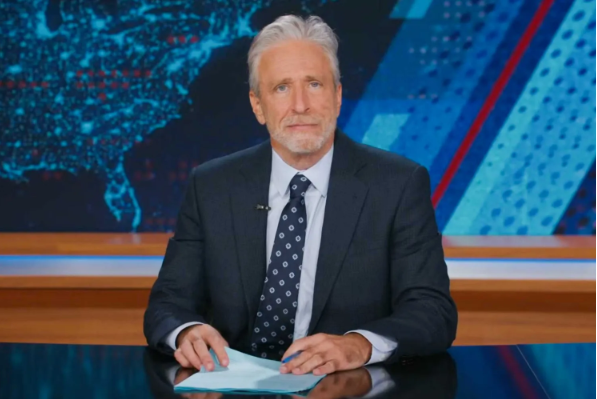TV
Jon Stewart Imagines John Oliver as Oliver Twist Begging for SNAP Benefits — A Satirical Reflection on Hunger and Hypocrisy
1. Jon Stewart’s Sharp Satire: The Scene That Sparked a Debate
In one of his most talked-about Daily Show monologues of 2025, Jon Stewart delivered a biting critique of U.S. policy priorities — particularly the contrast between domestic hunger and international financial aid. During the segment, Stewart imagined a comedic yet haunting visual: fellow host John Oliver dressed as Charles Dickens’ orphan Oliver Twist, begging for SNAP (Supplemental Nutrition Assistance Program) benefits while the government funded billions of dollars in international bailouts.
The image was hilarious on the surface but heavy with meaning underneath. Stewart’s setup came during a discussion of how SNAP benefits were being temporarily reduced amid government budget disputes, while billions were simultaneously being allocated to global trade partners, including funding related to beef imports. The comedic “play” he imagined — Oliver Twist pleading for “Argentinian beef” — embodied the absurdity of a nation capable of feeding the world yet struggling to ensure its own citizens can eat.
Stewart’s delivery was classic — fast-paced, impassioned, and steeped in irony. “In another era,” he joked, “we would have had John Oliver come out in rags, bowl in hand, begging for some of that Argentine beef.” The crowd erupted in laughter, but the message was unmistakable: when economic priorities skew toward foreign aid and corporate deals at the expense of domestic welfare, satire becomes a mirror reflecting uncomfortable truths.

2. The Symbolism of Oliver Twist: Comedy with a Conscience
Charles Dickens’ Oliver Twist has long stood as a symbol of poverty and systemic neglect — the story of a child who dares to ask for more in a world that gives him nothing. By invoking that imagery, Stewart tapped into a cultural touchstone that transcends generations. He wasn’t just making fun of bureaucracy; he was calling attention to a moral failing in public policy.
Through his imagined “performance” starring John Oliver, Stewart juxtaposed historical suffering with modern absurdity. Oliver Twist begging for “more” SNAP benefits or imported beef becomes a stand-in for millions of Americans struggling to afford groceries in an economy of abundance. The satire lands precisely because it feels both funny and uncomfortably real.
The “Oliver Twist” comparison also hints at the growing gap between wealth and need in the U.S. — a society where billions in subsidies and trade deals flow freely, yet discussions of basic food security are still politicized. Stewart’s comedic instinct to turn a 19th-century literary moment into a 21st-century commentary reveals the timelessness of inequality and the enduring power of humor as protest.
3. The Reality Behind the Joke: Food Insecurity and SNAP Cuts
Behind the humor lies a sobering reality. SNAP, the nation’s primary food assistance program, supports more than 40 million Americans. In recent years, the program has faced budget reductions and political battles that threaten its stability. During the very week of Stewart’s episode, debates in Congress over spending cuts had led to fears that millions could see delayed benefits — an especially dire prospect as inflation continued to drive up food prices.
Stewart’s criticism wasn’t just about numbers; it was about values. He contrasted the potential $8.3 billion monthly reduction in domestic food aid with the tens of billions spent abroad — particularly in economic packages benefiting global partners and agricultural imports. To him, the image of an American “Oliver Twist” asking for food wasn’t hypothetical — it was symbolic of a nation out of balance.
His commentary resonated widely because it hit a nerve. Food insecurity in the U.S. has quietly risen again, particularly among low-income families and children. By turning those statistics into satire, Stewart transformed cold data into something human — something the audience could feel. His exaggerated “John Oliver as Oliver Twist” metaphor became a tool to translate policy into emotion.
4. Comedy as a Weapon: The Power of Political Satire
Jon Stewart has built his legacy on transforming humor into activism. From his early days on The Daily Show to his return in recent years, he’s proven that satire can do more than entertain — it can educate, provoke, and challenge authority. In this particular segment, the humor was biting but accessible, striking a balance between laughter and outrage.
By referencing his old show’s theatrical style — “in another era, we’d do a full musical number about this” — Stewart reminded viewers that comedy and commentary can coexist powerfully. His imagined skit was an exaggeration, but the absurdity only underscored his point: how can a wealthy nation debate feeding its citizens while cutting checks abroad?
What makes Stewart’s satire so effective is that it operates on multiple levels. The literary allusion appeals to intellectual audiences, the pop-culture connection to John Oliver gives it mainstream flavor, and the policy critique grounds it in reality. Each layer reinforces the other. It’s not simply a joke — it’s a diagnosis of political dysfunction delivered with a smile.
Moreover, Stewart’s self-awareness adds depth to his commentary. He often acknowledges the fine line between humor and sensitivity, making sure the laughter never comes at the expense of those suffering. In this case, the humor wasn’t directed at people relying on SNAP — it was aimed squarely at the policymakers who control the purse strings.
5. Lessons from the Segment: Hunger, Hypocrisy, and Hope
When the laughter fades, what remains is a question that Stewart’s comedy forces us to confront: What does it say about a country that prioritizes optics and diplomacy over feeding its own people? The Oliver Twist analogy serves as both a cultural critique and a call to action — reminding viewers that behind every policy number are real human lives.
Stewart’s imagined “John Oliver as Oliver Twist” moment may have been a joke, but it encapsulated something profound about the American condition: a society capable of extraordinary generosity abroad that still hesitates to ensure basic dignity at home. His performance highlighted not only political irony but also moral responsibility.
As the segment concluded, Stewart implored viewers to pay attention to what really matters — not the theatrics of politics, but the tangible consequences of those decisions. His humor peeled away layers of apathy and bureaucracy to expose the simple truth Dickens revealed centuries ago: hunger is not a joke, but sometimes only a joke can make us see it clearly.
In the end, the image of John Oliver dressed as a ragged Oliver Twist, holding an empty bowl, begging for government food assistance, is more than comedic imagination — it’s a mirror. A mirror reflecting how far we’ve come technologically and economically, and yet how familiar the old story still feels. Just like Dickens’ world, ours is still one where the powerful debate the worth of the hungry.
From: Doublejoydesigns
